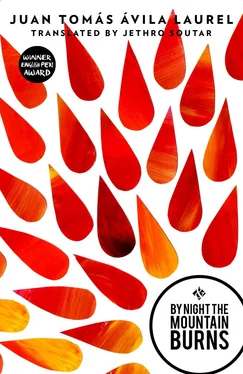Juan Ávila Laurel - By Night the Mountain Burns
Здесь есть возможность читать онлайн «Juan Ávila Laurel - By Night the Mountain Burns» весь текст электронной книги совершенно бесплатно (целиком полную версию без сокращений). В некоторых случаях можно слушать аудио, скачать через торрент в формате fb2 и присутствует краткое содержание. Год выпуска: 2014, Издательство: And Other Stories Publishing, Жанр: Современная проза, на английском языке. Описание произведения, (предисловие) а так же отзывы посетителей доступны на портале библиотеки ЛибКат.
- Название:By Night the Mountain Burns
- Автор:
- Издательство:And Other Stories Publishing
- Жанр:
- Год:2014
- ISBN:нет данных
- Рейтинг книги:5 / 5. Голосов: 1
-
Избранное:Добавить в избранное
- Отзывы:
-
Ваша оценка:
- 100
- 1
- 2
- 3
- 4
- 5
By Night the Mountain Burns: краткое содержание, описание и аннотация
Предлагаем к чтению аннотацию, описание, краткое содержание или предисловие (зависит от того, что написал сам автор книги «By Night the Mountain Burns»). Если вы не нашли необходимую информацию о книге — напишите в комментариях, мы постараемся отыскать её.
By Night the Mountain Burns — читать онлайн бесплатно полную книгу (весь текст) целиком
Ниже представлен текст книги, разбитый по страницам. Система сохранения места последней прочитанной страницы, позволяет с удобством читать онлайн бесплатно книгу «By Night the Mountain Burns», без необходимости каждый раз заново искать на чём Вы остановились. Поставьте закладку, и сможете в любой момент перейти на страницу, на которой закончили чтение.
Интервал:
Закладка:
Time went by on our island and there was no news of our fathers, who were somewhere you went to by boat. The sun rose and set, it rained, we experienced the rain in the big village and then went to the settlements with our mothers when the dry season came. On our island, everyone went to the settlements where they had plantations. Almost everyone went, except for my grandfather and a few others who had reason to stay in the big village. Something must have happened with my grandfather, circumstances that I was never made aware of, because I have the feeling I never saw him again after leaving him on the beach by the cemetery. I left him sitting there, talking to the canoeman who had been transporting grandmother’s daughter, and I have the feeling I never saw him again, although when that man came crying to the house my grandfather must surely have been there and said something. But I don’t remember. As far as my memory is concerned, I left him there on the beach, the day we gave food to the Saltwater King. That was the last I knew of him, though in truth it probably wasn’t. That time and place is doubtless engraved on my memory because of the special circumstances. Besides, that was the day I discovered that grandfather was sick, and that perhaps because of his sickness he’d lost his job on the boat where he was captain, and was brought to the big village for someone to take care of him. He had a bag strapped to his stomach to put his leftovers in, his excrement. I don’t want to talk about it any more. But through grandfather I learned that such a thing could happen to a human being. And I think he was the only person on the island who suffered from it. So it gives me a funny feeling when I think about it. In any case, life went on and as far as I’m concerned I left him sitting there on the cemetery beach, and that was the last I knew of him until he died. When he died, on the very day of his death, they burned a lot of things from his room, things we’d seen when we went in there in his absence. But I’d rather not talk about it. I’ve said why.
So in the dry season everyone who could went to the settlements to work on the plantations and to harvest what they’d planted at the start of the rainy season. Those who couldn’t make the journey, for whatever reason, stayed in the big village, including the Padre . He never went to the settlements, not once. I’d have liked him to have gone to the village whose patron saint is San Xuan. I’d have liked him to have spent the night there. But there was no Misión house there, and if there had been, he’d have had to sleep on a bed of dry banana leaves. On a bed of dry banana leaves on the floor under a jambab’u roof. If the priest had gone to San Xuan’s settlement, he’d have been given a chamber pot to pee in at night. And if he’d had bigger needs, he’d have had to do them in that chamber pot and give it to one of the villagers in the morning to empty out somewhere, somewhere on the outskirts of the village. I think it was because of all these things that the Padre never went to the settlements and always stayed in the big village, at the Misión . But I’d have liked him to have spent a night in the village of San Xuan, the very severe patron saint of that place that has a beach like a cave. I’d have liked to have seen what happened between the Padre and the patron, whether the patron would have allowed the Padre to sleep.
We went to the settlements with our mothers, and those children who were old enough to walk walked and those who were too young were carried on backs. And almost everyone who went to the villages had to go down the steep hill that had drinking water at the bottom. That was the only way to get to almost all the settlements, unless you went by canoe. But woe betide anyone who tried to paddle their canoe into the cave at San Xuan’s village. The waves there were … Anyway, you got there somehow: there were too many things to do in the settlements not to go; you couldn’t just stay in the big village for the dry season because of the waves or the steep hill. For whoever stayed in the big village ran the risk of having nothing to eat in the rainy season. Or not having enough to eat: having too little to see them through the rainy spell. Eating fish was a different business. It was very hard to get fish to eat in the big village during the dry season. And there were two reasons for that: firstly, there were not many men around to go fishing; secondly, the sea was very different from the way it was when fishing was easy, for the water became cold. So to eat fish again, you had to wait until everyone came back to the big village and the weather turned. You led a different life in the settlements. Part of that life, something that happened when we were in the south village during the dry season, became etched on my memory forever. It was something that caused great sorrow, in me and in everyone else who witnessed it, and I will tell of it now.
That friend of grandfather’s, the one who came to speak to him the day they went to the cemetery, was in the south village, and someone asked him to build a canoe. As I said earlier, he was a maestro. A maestro in canoe building and in other things. For example, he knew how to speak to the Calabarians, and to dance like them. Anyway, he agreed to the request, went to wherever the chosen tree was, felled it and without further ado got down to hollowing out the trunk. The hollowing out stage is the hardest stage and so sometimes the maestro is helped by a younger man. In this case he and the younger man had made good progress, and they were working away when a woman came to see them with a child on her back. Who was the woman? She was the maestro’s goddaughter, a woman who’d lost her father when she was very young, then lost her mother too and was left all alone, all alone except for a sister. She’d gone to where the maestro was working to ask him a favour. She asked the maestro, her godfather, to take her to the big village because her son was sick. Her son had only just started crawling, so he was not many months old. And who was her son? Well in fact it was Luis Mari. She went to where her godfather worked to ask a favour of him. She was all alone in that village and her child was sick, her only child, a child she’d had after visiting the boat of the sailors who stole our fish. She spoke with a tearful voice and said that the white child was burning up with fever and there was no medicine in the south village, as everyone knew, so she thought she should take him to the big village, in case the man in charge of the hospital, or anyone else for that matter, had anything to give the boy. The maestro didn’t so much as look at the child, who was on the woman’s back with his eyes closed, sleeping; he accepted what she said and didn’t doubt her need. But the child’s sickness had come at a bad time, for all the men in the south village had already been told their help would be required that very afternoon to carry the half-built canoe to the shore where the final work on it would be done. And the canoe owner’s female relatives had been told to prepare malanga soup for everyone who took part in that arduous task. Everything was ready and everyone was all set, so the job of moving the canoe couldn’t not take place. That’s what he told her, but as she was his goddaughter, he promised he’d help her as soon as the half-built canoe had reached its final destination. He said that as soon as the canoe was on the sand he’d ask the canoe’s owner to take her to the big village to find medicine for her sick child, the child with the foreign father. The child whose father was from a friendly nation, albeit one that stole our fish. The young man who was the future owner of the canoe could not refuse such a favour, given his obligations to the maestro. And the maestro himself was old and he found certain tasks onerous, and he’d have found it onerous to paddle, with some haste, to the big village in a canoe that carried his goddaughter and her child. They agreed to do as the maestro said and the woman went home to wait until it was time for her and the child to leave. Hours went by and everyone gathered around the half-built canoe. The rope was tied, the rollers were cut, smaller branches and tree trunks were collected. They waited for the last people to arrive for, as everyone lived in different places, it took more of an effort for some to get there than others, so not everyone arrived at the same time. And then the mother of the sick child appeared. That woman, who had only one living family member, a sister, knew there could never be too many hands when it came to pulling a canoe to its final destination. She knew her strength ought not be wasted, for until it was time for them to leave with her sick child, she’d be doing nothing, nothing other than waiting. So she went to help and she carried her sick son on her back.
Читать дальшеИнтервал:
Закладка:
Похожие книги на «By Night the Mountain Burns»
Представляем Вашему вниманию похожие книги на «By Night the Mountain Burns» списком для выбора. Мы отобрали схожую по названию и смыслу литературу в надежде предоставить читателям больше вариантов отыскать новые, интересные, ещё непрочитанные произведения.
Обсуждение, отзывы о книге «By Night the Mountain Burns» и просто собственные мнения читателей. Оставьте ваши комментарии, напишите, что Вы думаете о произведении, его смысле или главных героях. Укажите что конкретно понравилось, а что нет, и почему Вы так считаете.












